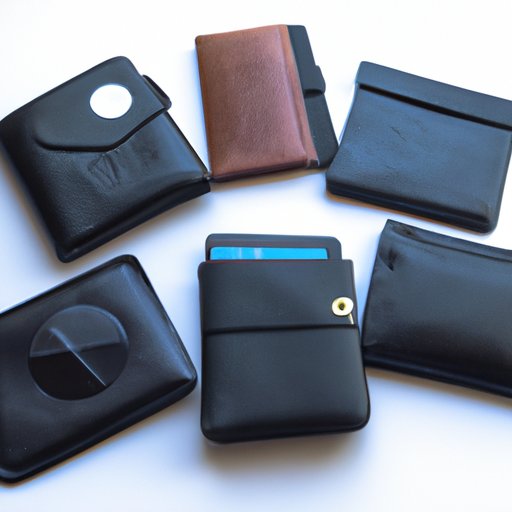Introduction
Cryptocurrency is digital money that can be used to purchase goods and services online. In order to store and use cryptocurrency, you need a crypto wallet. A crypto wallet is a secure digital wallet used to store, send, and receive digital currency like Bitcoin. Crypto wallets come in many forms, from desktop and mobile apps to hardware devices and even paper. The type of wallet you choose will depend on your individual needs and preferences.
Definition of Crypto Wallets
A crypto wallet is a software program that stores private and public keys and interacts with various blockchain to enable users to send and receive digital currency and monitor their balance. If you want to use Bitcoin or any other cryptocurrency, you will need to have a crypto wallet.

Overview of Different Types of Crypto Wallets
Crypto wallets can be divided into two main categories: hot wallets and cold wallets. Hot wallets are connected to the internet and are more convenient to use but are less secure. Cold wallets are not connected to the internet and are more secure but are less convenient to use. In addition, crypto wallets can be further divided into hardware wallets, software wallets, desktop wallets, mobile wallets, and web wallets.
Comparison of Different Crypto Wallets: A Comprehensive Guide
When choosing a crypto wallet, it is important to consider its security features, privacy features, and ease of use. Here is a comprehensive guide to comparing different crypto wallets and understanding their features.
Hot and Cold Wallets
Hot wallets are connected to the internet and are more convenient to use but are less secure. They are usually web-based and can be accessed from any device with an internet connection. Cold wallets are not connected to the internet and are more secure but are less convenient to use. They are usually hardware-based and require physical access to the device.
Hardware and Software Wallets
Hardware wallets are physical devices designed to store cryptocurrency securely. They are typically more secure than software wallets because they are not connected to the internet and are more difficult to hack. Software wallets are applications that can be downloaded onto a computer or mobile device. They are generally less secure than hardware wallets but are easier to use.
Desktop, Mobile, and Web Wallets
Desktop wallets are applications that can be downloaded and installed on a desktop computer. They provide the highest level of security but are not as convenient to use as mobile or web wallets. Mobile wallets are applications that can be downloaded and installed on a smartphone. They are more convenient to use but are not as secure as desktop wallets. Web wallets are online services that can be accessed through a web browser. They are the least secure but the most convenient to use.

How to Choose a Secure Crypto Wallet
When choosing a crypto wallet, it is important to consider its security features, privacy features, and ease of use. Security features include multi-signature authentication, encryption, and secure storage. Privacy features include transaction anonymity and user data privacy. Ease of use includes user interface design and customer support.
Top 5 Crypto Wallets for Beginners
If you are new to cryptocurrencies, here are five of the most popular crypto wallets for beginners:
- Coinbase
- Exodus
- Ledger Nano S
- Trezor
- Mycelium
Pros and Cons of the Most Popular Crypto Wallets
Here is a brief overview of the pros and cons of the most popular crypto wallets:
Coinbase
Pros: Easy to use, user-friendly interface, supports multiple cryptocurrencies, insured against theft.
Cons: Not fully anonymous, limited payment methods, higher fees.
Exodus
Pros: Supports multiple cryptocurrencies, user-friendly interface, no KYC/AML requirements, low fees.
Cons: No mobile app, limited customer support, not open source.
Ledger Nano S
Pros: Highly secure, supports multiple cryptocurrencies, easy to use.
Cons: Expensive, not open source, limited customer support.
Trezor
Pros: Highly secure, supports multiple cryptocurrencies, open source.
Cons: Expensive, limited customer support, not very user friendly.
Mycelium
Pros: Open source, highly secure, supports multiple cryptocurrencies.
Cons: Limited customer support, not very user friendly, not available in all countries.

Understanding the Different Types of Crypto Wallets
It is important to understand the different types of crypto wallets in order to choose the right one for your needs. Here is a brief overview of the different types of crypto wallets:
Hot Wallets
Hot wallets are connected to the internet and are more convenient to use but are less secure. They are usually web-based and can be accessed from any device with an internet connection.
Cold Wallets
Cold wallets are not connected to the internet and are more secure but are less convenient to use. They are usually hardware-based and require physical access to the device.
Hardware Wallets
Hardware wallets are physical devices designed to store cryptocurrency securely. They are typically more secure than software wallets because they are not connected to the internet and are more difficult to hack.
Software Wallets
Software wallets are applications that can be downloaded onto a computer or mobile device. They are generally less secure than hardware wallets but are easier to use.
Desktop Wallets
Desktop wallets are applications that can be downloaded and installed on a desktop computer. They provide the highest level of security but are not as convenient to use as mobile or web wallets.
Mobile Wallets
Mobile wallets are applications that can be downloaded and installed on a smartphone. They are more convenient to use but are not as secure as desktop wallets.
Web Wallets
Web wallets are online services that can be accessed through a web browser. They are the least secure but the most convenient to use.
Conclusion
Choosing the right crypto wallet for your needs can be a daunting task. It is important to consider the security features, privacy features, and ease of use of each wallet before making a decision. There are many different types of crypto wallets, from hot and cold wallets to hardware and software wallets. We hope this guide has helped you understand the different types of crypto wallets and make an informed decision about which one is right for you.
(Note: Is this article not meeting your expectations? Do you have knowledge or insights to share? Unlock new opportunities and expand your reach by joining our authors team. Click Registration to join us and share your expertise with our readers.)
